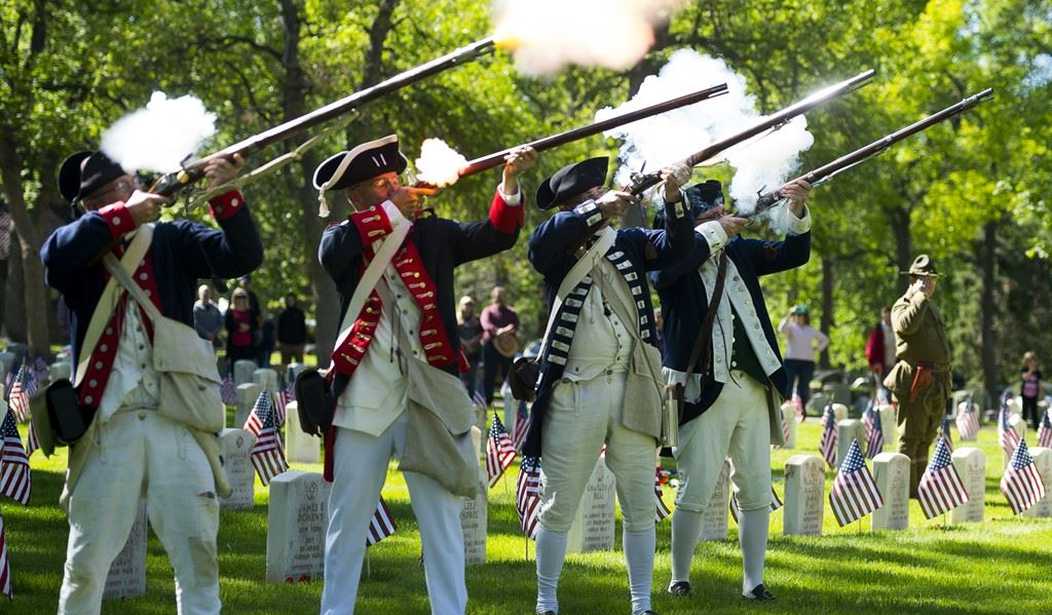Historical television has been a hit or miss proposition since the 1950s, when CBS aired the series, You Are There. Narrated by Walter Cronkite, the series first aired on radio beginning in 1947 and moved to TV in 1953.
It was a fascinating concept. CBS correspondents would report on earth-shaking events from the past as if they were doing a live broadcast, interviewing historical figures, and providing analysis as if the events were happening in real time. I tried something similar early in my writing career, reporting on the Battle of Gettysburg and the signing of the Declaration of Independence as if I were blogging about the events live.
Too bad George Lucas wasn't around to sex up the CBS production.
Television hasn't precisely neglected the American Revolution, but with no photographs or film, it's hard to make the events of the war and all that was happening at the time entertaining or even very interesting.
There have been exceptions. The 1995 TLC mini-series The Revolutionary War, narrated by Charles Kuralt, was exceptional, even if it gave a limited view of what was happening elsewhere. The Revolution (also known as The American Revolution), a 13-episode miniseries that aired on The History Channel in 2006 and was narrated by Edward Hermann, was very good, very polished, but lacked any zest. It was a paint-by-numbers effort of telling a story that resists a linear construct; too much is happening in too many places for us to gain an understanding of the whys and wherefores of the revolution.
PBS and Apple TV also created programs that dealt with the revolution. Now, Ken Burns, easily America's finest documentarian of history and culture, has taken a shot at telling the story of us. After his monumental achievement in telling the story of The Civil War in 1990, Burns was primed to tackle America's founding in all its complexity, pain, suffering, brutality, and hypocrisy.
For nine years, he and his team sourced original material, tracked down unique voices not normally heard, gathered the perspectives of the English, the French, Africans, women, children, loyalists, and patriots, and the result is brilliant storytelling. Watching the series leaves the viewer with a far deeper understanding of the forces and people that shaped our nation at its founding.
"We hear the loudest yelps for liberty among the drivers of negroes," wrote Samuel Johnson in 1775, the man who compiled the first English language dictionary and a noted man of letters. Johnson was commenting on the fact that some of the most outspoken patriots were slaveowners. Indeed, one of the central theses of Burns's documentary is the duality of America's psyche at the time of the revolution. At its heart, the American Revolution was America's first civil war, as brother bled brother, families were torn apart, and some of the most vicious battles were between neighbors on different sides of the divide.
The Battle of Kings Mountain in 1780 in South Carolina pitted loyalists against patriot militias in a bloody, hand-to-hand fight that ended with the loyalists being nearly annihilated to the last man.
"It was a bloody, gritty affair, a tragic civil war and a global conflict as much as it was a war for independence," writes the Smithsonian's Vanessa Armstrong. At stake were tens of millions of acres of land in North America. Who would control it? Who would profit from it? Who would live there?
The English, the French, Native Americans, the Spanish, and others saw North America as a vast treasure that one only needed to reach out and grab the riches and power right in front of them. Burns balances his documentary by telling all sides of the story as dispassionately as possible. And it works.
Burns told the Smithsonian Magazine what the biggest thing he took away from his effort was:
The grittiness is what I think is going to be surprising. A lot of that has to do with this superficiality that attends the Revolution—because maybe it’s not even in high school, but in eighth grade, that [people studied] it last with any significance. It’s just an incredibly difficult war, and the [lack of] photographs makes it seem cartoonish. The sacrifices are different than watching somebody fall as they’re climbing up the beaches of Normandy on D-Day. But it is, of course, all of that and much more.
The voices are supplied by a stable of great actors, starting with Peter Coyote's heartfelt narration, and moving on to Paul Giamatti's John Adams (reprising his role as Adams in the HBO mini-series), Josh Brolin reading Washington's words, "giving General Washington a deep-voiced respectability," according to USA Today. Jeff Daniels is Thomas Jefferson. Samuel L. Jackson, Morgan Freeman, Meryl Streep, Tom Hanks, Edward Norton, and Matthew Rhys add gravitas to the production.
The American Revolution is a must-watch television if you want to take a deep dive into our nation's founding. It's a story told by a master storyteller who has been piquing our interest and satisfying our need to know about everything from baseball to the Brooklyn Bridge, and the Vietnam War, for much of our adult lives.
Ken Burns is a national treasure. He has once again contributed to the storehouse of knowledge that makes up who we were, who we are now, and who we will be going forward.
PJ Media has been a source of independent news for more than 20 years. Unafraid to take on the critical issues that the national media won't cover, our team of writers and editors works tirelessly to bring stories that inform and make readers think about America and its place in the world.
Help us continue to report the news you care about. Use promo code FIGHT to get 60% off your VIP membership.










Join the conversation as a VIP Member